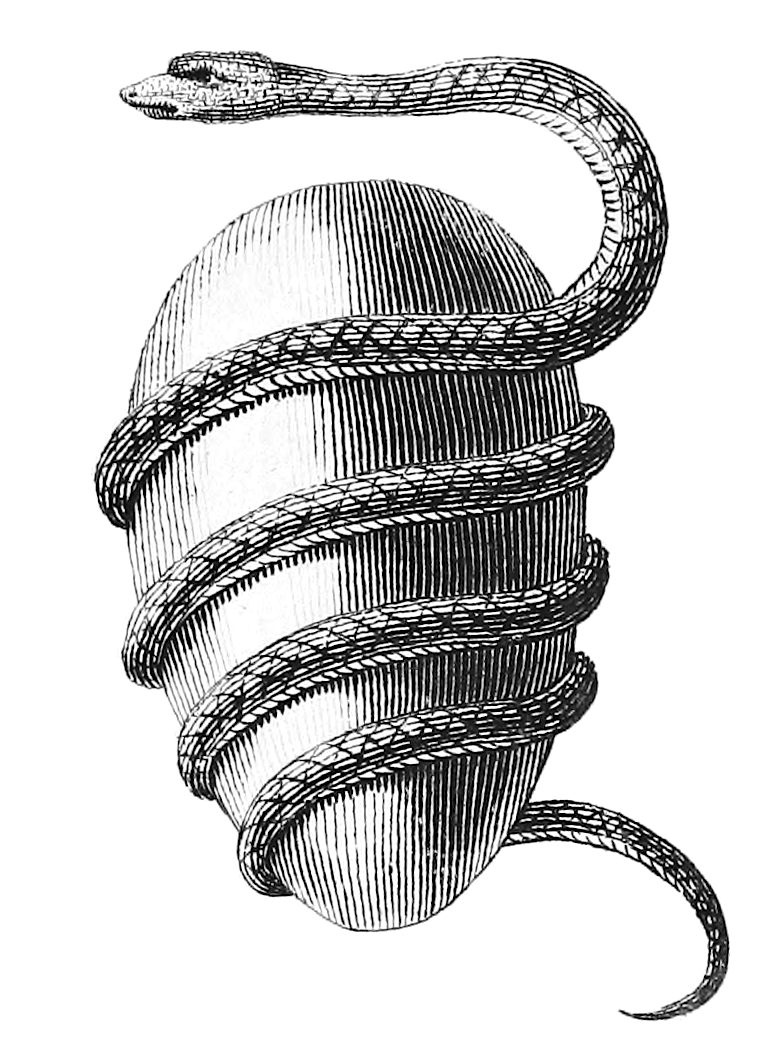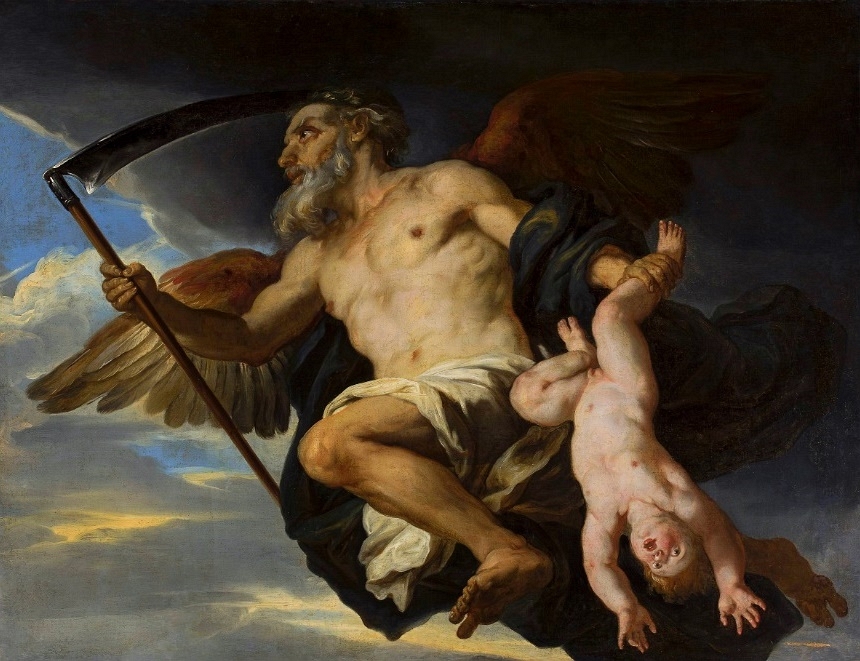|
Phanes
Phanes ( grc, Φάνης, Phánēs, genitive ) or Protogonus () was the mystic primeval deity of procreation and the generation of new life, who was introduced into Greek mythology by the Orphic tradition; other names for this Classical Greek Orphic concept included Ericapaeus ( grc, Ἠρικαπαῖος/Ἠρικεπαῖος, Ērikapaîos/Ērikepaîos, power) and Metis ("thought"). Mythology Orphic cosmogony In Orphic cosmogony, Phanes is often equated with Eros or Mithras, and has been depicted as a deity emerging from a cosmic egg, entwined with a serpent. He had a helmet and had broad, golden wings. The Orphic cosmogony is quite unlike the creation sagas offered by Homer and Hesiod. Scholars have suggested that Orphism is "un-Greek" even "Asiatic" in conception, because of its inherent dualism. Chronos (Time) is said to have created the silver egg of the universe, out of which burst the first-born deity Phanes, or Phanes-Dionysus. Phanes was a male God, in an ... [...More Info...] [...Related Items...] OR: [Wikipedia] [Google] [Baidu] |
Cosmic Egg
The world egg, cosmic egg or mundane egg is a mythological motif found in the cosmogonies of many cultures that is present in Proto-Indo-European culture and other cultures and civilizations. Typically, the world egg is a beginning of some sort, and the universe or some primordial being comes into existence by "hatching" from the egg, sometimes lain on the primordial waters of the Earth. Eggs symbolize the unification of two complementary principles (represented by the egg white and the yolk) from which life or existence, in its most fundamental philosophical sense, emerges. Vedic mythology The earliest idea of the "cosmic egg" comes from some of the Sanskrit scriptures. The Sanskrit term for it is Brahmanda (ब्रह्माण्ड) which is derived from two words – 'Brahma' (ब्रह्मा) the 'creator god' in Hinduism and 'anda' (अण्ड) meaning 'egg'. Certain Puranas such as the Brahmanda Purana speak of this in detail. The Rig Veda (RV 10.121) ... [...More Info...] [...Related Items...] OR: [Wikipedia] [Google] [Baidu] |
Orphism (religion)
Orphism (more rarely Orphicism; grc, Ὀρφικά, Orphiká) is the name given to a set of religious beliefs and practices originating in the ancient Greek and Hellenistic world, associated with literature ascribed to the mythical poet Orpheus, who descended into the Greek underworld and returned. This type of journey is called a katabasis and is the basis of a several hero worships and journeys. Orphics revered Dionysus (who once descended into the Underworld and returned) and Persephone (who annually descended into the Underworld for a season and then returned). Orphism has been described as a reform of the earlier Dionysian religion, involving a re-interpretation or re-reading of the myth of Dionysus and a re-ordering of Hesiod's ''Theogony'', based in part on pre-Socratic philosophy. The central focus of Orphism is the suffering and death of the god Dionysus at the hands of the Titans, which forms the basis of Orphism's central myth. According to this myth, the infan ... [...More Info...] [...Related Items...] OR: [Wikipedia] [Google] [Baidu] |
Chronos
Chronos (; grc-gre, Χρόνος, , "time"), also spelled Khronos or Chronus, is a personification of time in pre-Socratic philosophy Pre-Socratic philosophy, also known as early Greek philosophy, is ancient Greek philosophy before Socrates. Pre-Socratic philosophers were mostly interested in cosmology, the beginning and the substance of the universe, but the inquiries of thes ... and later literature. Chronos is frequently confused with, or perhaps consciously identified with, the Titans, Titan Cronus in antiquity due to the similarity in names. The identification became more widespread during the Renaissance, giving rise to the iconography of Father Time wielding the harvesting scythe. Greco-Roman mosaics depicted Chronos as a man turning the zodiac wheel. He is comparable to the Aion (deity), deity Aion as a symbol of cyclical time. He is usually portrayed as an old callous man with a thick grey beard, personifying the destructive and stifling aspects of time. Name ... [...More Info...] [...Related Items...] OR: [Wikipedia] [Google] [Baidu] |
Erikepaios
In the Orphic religion, Erikepaios ( grc, Ἠρικαπαῖος/Ἠρικεπαῖος, Ērikapaîos/Ērikepaîos, power; la, Ericepaeus) was a title for the god Phanes, mentioned in Orphic poetry and the associated Dionysian Mysteries, a non-Greek name for which no certain interpretation has been found. Discussion Scholars have long been perplexed by the name ''Erikepaios'', and naturally, most of them have attempted to derive it from Greek etymology, however this seems questionable linguistically. The name has also been thought to have Hebrew origins because of its resemblance to ''erekh appayim''. It has been argued, even in antiquity, that the name ''Erikepaios'' was an Oriental import. Thus, John Malalas, the 6th century CE Antiotian historian, derives the name from the language spoken in his region. The name is first mentioned with certainty in the Orphic papyrus from Gurôb, a Dionysian Mysteries text of the late 3rd century BCE. The mythographer O ... [...More Info...] [...Related Items...] OR: [Wikipedia] [Google] [Baidu] |
Ananke (mythology)
In ancient Greek religion, Ananke (; grc, Ἀνάγκη), from the common noun , "force, constraint, necessity") is the personification of inevitability, compulsion and necessity. She is customarily depicted as holding a spindle. One of the Greek primordial deities, the births of Ananke and her brother and consort, Chronos (the personification of Time, not to be confused with the Titan Cronus) were thought to mark the division between the eon of Chaos and the beginning of the cosmos. Ananke is considered the most powerful dictator of fate and circumstance. Mortals and gods alike respected her power and paid her homage. Sometimes considered the mother of the Fates, she is thought to be the only being to influence their decisions (according to some sources, excepting Zeus also). According to Schowalter and Friesen, she and the Fates "are all sufficiently tied to early Greek mythology to make their Greek origins likely." The ancient Greek traveller Pausanias wrote of a templ ... [...More Info...] [...Related Items...] OR: [Wikipedia] [Google] [Baidu] |
Uranus (mythology)
In Greek mythology, Uranus ( ), sometimes written Ouranos ( grc, Οὐρανός, , sky, ), is the personification of the sky and one of the Greek primordial deities. According to Hesiod, Uranus was the son and husband of Gaia (Earth), with whom he fathered the first generation of Titans. However, no cult addressed directly to Uranus survived into Classical times, and Uranus does not appear among the usual themes of Greek painted pottery. Elemental Earth, Sky, and Styx might be joined, however, in solemn invocation in Homeric epic. Uranus is associated with the Roman god Caelus and the Jewish god Yahweh. Etymology Most linguists trace the etymology of the name to a Proto-Greek form ''*Worsanós'' (), enlarged from *''ṷorsó-'' (also found in Greek ''()'' 'to urinate', Sanskrit ''varṣá'' 'rain', Hittite ''ṷarša-'' 'fog, mist'). Robert S. P. Beekes, ''Etymological Dictionary of Greek'', vol. 2 (Leiden: Brill, 2009), 1128–1129. The basic Indo-European root ... [...More Info...] [...Related Items...] OR: [Wikipedia] [Google] [Baidu] |
Nyx (mythology)
Nyx (; , , "Night") is the Greek goddess and personification of night. A shadowy figure, Nyx stood at or near the beginning of creation and mothered other personified deities, such as Hypnos (Sleep) and Thanatos (Death), with Erebus (Darkness). She is the first child of Chaos. She is typically portrayed as either a winged goddess with a dark cloud halo or dressed in black surrounded by dark mist. Her Roman equivalent is Nox. Mythology and literature Hesiod In Hesiod's ''Theogony'', Nyx is born of Chaos. With Erebus (Darkness), Nyx gives birth to Aether (Brightness) and Hemera (Day). Later, on her own, Nyx gives birth to Moros (Doom, Destiny), the Keres (Destruction, Death), Thanatos (Death), Hypnos (Sleep), the Oneiroi (Dreams), Momus (Blame), Oizys (Pain, Distress), the Hesperides, the Moirai (Fates), Nemesis (Indignation, Retribution), Apate (Deceit), Philotes (Friendship), Geras (Old Age), and Eris (Strife). In his description of Tartarus, Hesiod locates ... [...More Info...] [...Related Items...] OR: [Wikipedia] [Google] [Baidu] |
Aristophanes
Aristophanes (; grc, Ἀριστοφάνης, ; c. 446 – c. 386 BC), son of Philippus, of the deme Kydathenaion ( la, Cydathenaeum), was a comic playwright or comedy-writer of ancient Athens and a poet of Old Attic Comedy. Eleven of his forty plays survive virtually complete. These provide the most valuable examples of a genre of comic drama known as Old Comedy and are used to define it, along with fragments from dozens of lost plays by Aristophanes and his contemporaries. Also known as "The Father of Comedy" and "the Prince of Ancient Comedy", Aristophanes has been said to recreate the life of ancient Athens more convincingly than any other author. His powers of ridicule were feared and acknowledged by influential contemporaries; Plato singled out Aristophanes' play '' The Clouds'' as slander that contributed to the trial and subsequent condemning to death of Socrates, although other satirical playwrights had also caricatured the philosopher. Aristophanes' second pla ... [...More Info...] [...Related Items...] OR: [Wikipedia] [Google] [Baidu] |
Eros (god)
In Greek mythology, Eros (, ; grc, Ἔρως, Érōs, Love, Desire) is the Greek god of love and sex. His Roman counterpart was Cupid ("desire").''Larousse Desk Reference Encyclopedia'', The Book People, Haydock, 1995, p. 215. In the earliest account, he is a primordial god, while in later accounts he is described as one of the children of Aphrodite and Ares and, with some of his siblings, was one of the Erotes, a group of winged love gods. Etymology The Greek , meaning 'desire', comes from 'to desire, love', of uncertain etymology. R. S. P. Beekes has suggested a Pre-Greek origin. Cult and depiction Eros appears in ancient Greek sources under several different guises. In the earliest sources (the cosmogonies, the earliest philosophers, and texts referring to the mystery religions), he is one of the primordial gods involved in the coming into being of the cosmos. In later sources, however, Eros is represented as the son of Aphrodite, whose mischievous interventions i ... [...More Info...] [...Related Items...] OR: [Wikipedia] [Google] [Baidu] |
Francesco De' Rossi
Francesco de' Rossi (1510–11 November 1563) was an Italian Mannerist painter who lived and worked in Florence, with periods in Bologna and Venice, ending with a long period in Rome, where he died. He is known by various names, usually the adopted one of Francesco Salviati or Il Salviati, after an early patron, but also Francesco Rossi and Cecchino del Salviati. He worked in fresco and oils, on ambitious history paintings, but also painted many portraits, and designed tapestries for the Medici. Biography Salviati was born in Florence. He apprenticed under Giuliano Bugiardini, Baccio Bandinelli, Raffaele Brescianino, and finally Andrea del Sarto in 1529–30. In 1531 he traveled to Rome, where he met another Bandinelli pupil, Giorgio Vasari, and helped to complete the frescoes on the ''Life of John the Baptist'' in the Palazzo Salviati for the Cardinal Giovanni Salviati. It is from his attachment to this household that he took on the surname. He frescoed an ''Annuncia ... [...More Info...] [...Related Items...] OR: [Wikipedia] [Google] [Baidu] |

_-_Foto_G._Dall'Orto.jpg)




